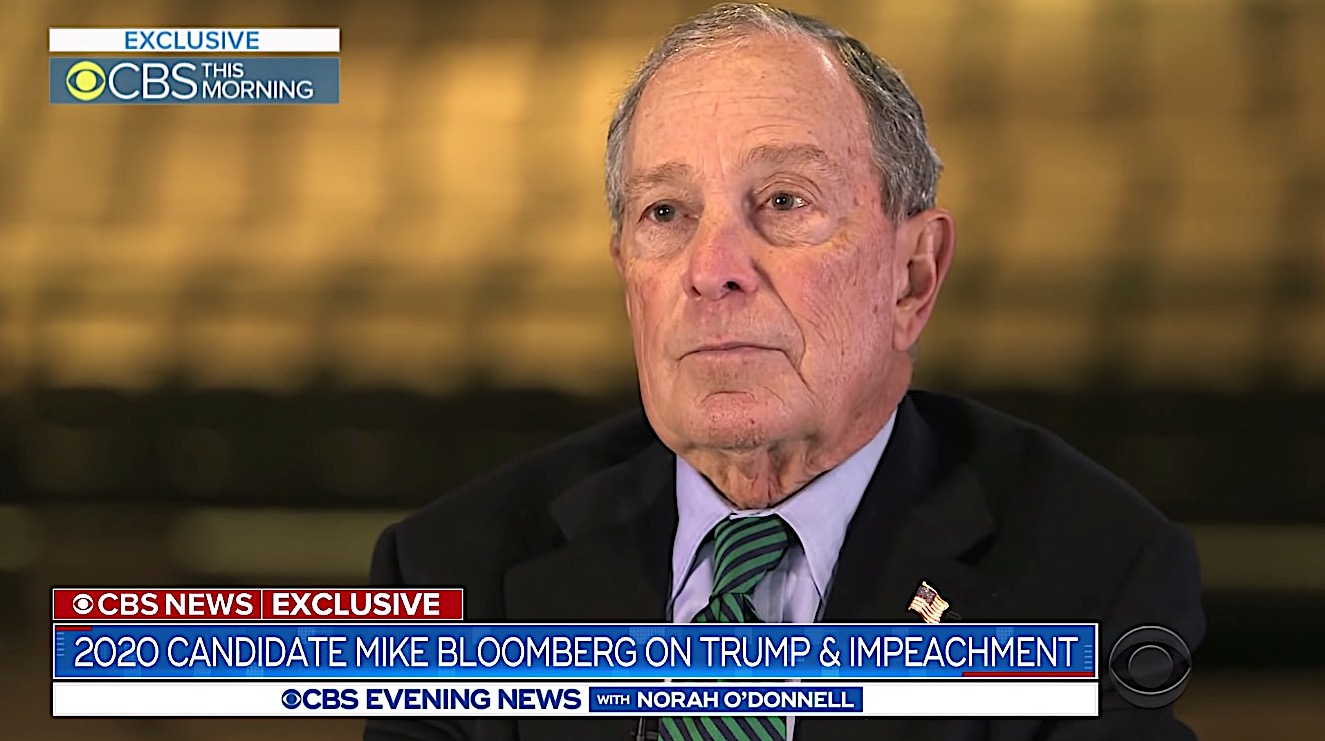Michael Bloomberg says he apologized for 'stop and frisk' now because nobody asked him earlier


A free daily email with the biggest news stories of the day – and the best features from TheWeek.com
You are now subscribed
Your newsletter sign-up was successful
CBS's Gayle King sat down with newly minted Democratic presidential candidate Michael Bloomberg in Colorado on Thursday, and she asked him why he decided to enter the race so late. "I looked at our national government getting worse," and he thought "we can't have four more years" President Trump, who "doesn't have the temperament or the ethics or the intellect to do the job," Bloomberg said in the interview, broadcast Friday morning. "And then I watched all the candidates. And I just thought to myself, 'Donald Trump would eat 'em up.'" Really? King asked. "Let me rephrase it," he said. "I think that I would do the best job of competing with him and beating him."
King asked Bloomberg about his recent apology for the "stop and frisk" policy he pursued as New York City mayor, now widely criticized as racist and counterproductively punitive. "Some people are suspicious of the timing of your apology," she said. "Well, nobody asked me about it until I started running for president," he said. "So come on." King pressed: "You just didn't mention it until now?" Bloomberg said he can't change the past, but it was a mistake, "I'm sorry. I apologize. Let's go fight the NRA."
Bloomberg, asked about being an old, white billionaire in an increasingly old, white Democratic field, said if people want to run, they should, "but don't complain to me that you're not in the race." "So you're saying if you want diversity then get in?" King asked. Bloomberg thanked her: "That is exactly a good way to phrase it. Thank you very much."
The Week
Escape your echo chamber. Get the facts behind the news, plus analysis from multiple perspectives.

Sign up for The Week's Free Newsletters
From our morning news briefing to a weekly Good News Newsletter, get the best of The Week delivered directly to your inbox.
From our morning news briefing to a weekly Good News Newsletter, get the best of The Week delivered directly to your inbox.
King asked Bloomberg if he thinks the House should impeach Trump. "I was, before, opposed to it, but after looking at all the evidence, I think yes," he said. "Sad, but yes." And the biggest thing that troubles him about Trump? she asked. "He does not seem to understand that he is an elected official whose job it is to work for the public rather than for himself," Bloomberg replied. Peter Weber

A free daily email with the biggest news stories of the day – and the best features from TheWeek.com
Peter has worked as a news and culture writer and editor at The Week since the site's launch in 2008. He covers politics, world affairs, religion and cultural currents. His journalism career began as a copy editor at a financial newswire and has included editorial positions at The New York Times Magazine, Facts on File, and Oregon State University.
-
 Political cartoons for February 16
Political cartoons for February 16Cartoons Monday’s political cartoons include President's Day, a valentine from the Epstein files, and more
-
 Regent Hong Kong: a tranquil haven with a prime waterfront spot
Regent Hong Kong: a tranquil haven with a prime waterfront spotThe Week Recommends The trendy hotel recently underwent an extensive two-year revamp
-
 The problem with diagnosing profound autism
The problem with diagnosing profound autismThe Explainer Experts are reconsidering the idea of autism as a spectrum, which could impact diagnoses and policy making for the condition
-
 Nobody seems surprised Wagner's Prigozhin died under suspicious circumstances
Nobody seems surprised Wagner's Prigozhin died under suspicious circumstancesSpeed Read
-
 Western mountain climbers allegedly left Pakistani porter to die on K2
Western mountain climbers allegedly left Pakistani porter to die on K2Speed Read
-
 'Circular saw blades' divide controversial Rio Grande buoys installed by Texas governor
'Circular saw blades' divide controversial Rio Grande buoys installed by Texas governorSpeed Read
-
 Los Angeles city workers stage 1-day walkout over labor conditions
Los Angeles city workers stage 1-day walkout over labor conditionsSpeed Read
-
 Mega Millions jackpot climbs to an estimated $1.55 billion
Mega Millions jackpot climbs to an estimated $1.55 billionSpeed Read
-
 Bangladesh dealing with worst dengue fever outbreak on record
Bangladesh dealing with worst dengue fever outbreak on recordSpeed Read
-
 Glacial outburst flooding in Juneau destroys homes
Glacial outburst flooding in Juneau destroys homesSpeed Read
-
 Scotland seeking 'monster hunters' to search for fabled Loch Ness creature
Scotland seeking 'monster hunters' to search for fabled Loch Ness creatureSpeed Read
